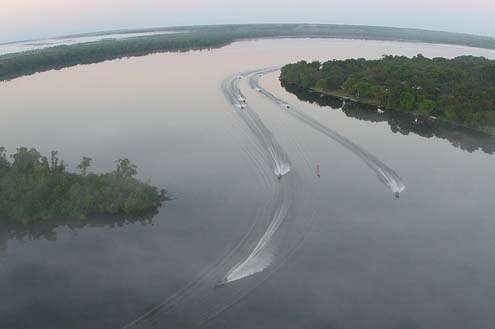
PALATKA, Fla. — The Bassmaster Elite Series came to the St. Johns River in March of 2011 and 2012. It took 70-pounds-plus to place in the top three both years, and sight-fishing was the dominant method of success.
But in polling the anglers at their usual pre-tournament meeting Wednesday, this event appears to be more of a wildcard than in previous years. That's mainly due to two factors: 1) the high, tannic water that has flowed into the river recently, especially during a four-inch rain Monday, and 2) how common sight-fishing for spawners has become here.
"There used to be only a handful of guys that sight-fished," Bernie Schultz noted last week at Lake Seminole. "Now there are only a handful of guys that don't."
The fact that there is less clear water in the St. Johns River this week may bunch the sight-fishermen tighter than usual.
"It fished big the last time we were here," said Terry Scroggins, who lives in Palatka and has placed sixth and second, respectively, the last two times here. "But Crescent Lake was clear then, and you can't see there at all now. I think it's going to fish pretty small."
So here are five things to watch at the four-day event on the St. Johns:
1. Sight-fishing vs. "just fishing" — B.A.S.S. veteran Rick Clunn thinks there will be just as much sight-fishing as usual, even though the high, black water influx may make spawning beds harder to see.
"Alton Jones, Shaw Grigsby and all those guys know where the beds are," Clunn said. "A bass is just like a salmon. It spawns in the same place every year. They know where the beds are, even if they can't see them. Sometimes that helps. You can't see them, but they can't see you."
So, it might be more appropriate to call this bed-fishing, if you know where the beds are but can't actually see the beds. But it amounts to the same thing.
However, even accomplished spawning bass anglers, like Dean Rojas, are making alternate plans this week. Partly that's due to the evolution of the sport, that Schultz referred to, and partly due to the high water.
"My past success here has been limited to sight-fishing," said Rojas, who posted top 12 finishes in 2011 and '12. "But knowing the condition of the river and the lakes, I don't think it is going to be as prevalent this time, unless somebody has some water to themselves. Here, that means two other boats around you instead of 10."
2. Spawning bass vs. post-spawn bass — The common myth about black bass spawning is that it happens all at once. But the reality is that it's a process that extends over several months, especially in Florida. This may or may not be the week that one of those big waves of spawning females move to the beds.
"A lot of the fish are done already," Gary Klein said. "I've seen a lot of fish guarding fry. So that opens up a lot of different things you can do. There are a couple of ways to catch these fish without looking at them."
And if you aren't casting to spawners, you might have some water to yourself.
3. The big bass effect — A "kicker" big bass is important in every tournament bag, but it might be more important here.
"It's Florida," said Rojas. "You might have five 13-inch fish that weight 7 or 8 pounds. A kicker goes a long way here."
Said Kevin Short, "A big bass will go a long, long way this week."
Although there will probably be a handful of 8-pounders weighed over the next four days, a 5-pounder or two will go a long way as well.
4. The top 50 cut weight — In 2012 the cut to make the top 50 was 27-10, or almost 14 pounds a day. In 2011, it was 26-5, just over 13 pounds a day.
Because of the high water, Kevin Short doesn't think it will take that much this time, saying, "I think you might make a check with 10, 10 ½ pounds."
But Edwin Evers, who won the 2011 tournament here, disagrees, saying, "They live here. We'll catch 'em."
5. Terry Scroggins — More times than not, fishing on your "home lake" seems to be a disadvantage in Elite Series events. But Scroggins has the history to prove that's not the case here. And if the sight-fishermen are as bunched as predicted, Scroggins will have a distinct edge, because he won't be in that group.
"I know where a lot of off-shore structure is here," Scroggins said. "And it's hard to find. I've got a home field advantage."
